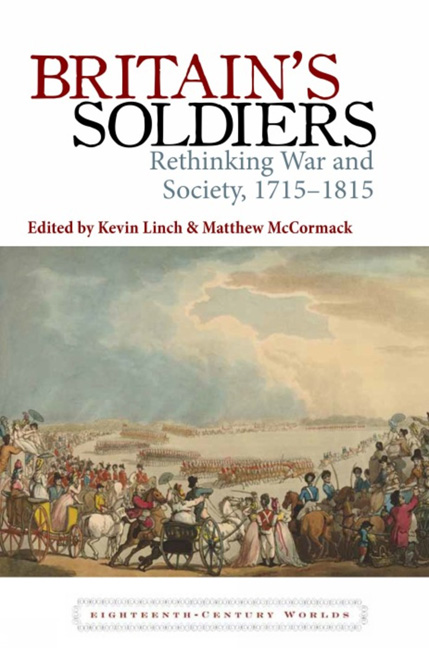Book contents
- Frontmatter
- Contents
- List of tables and figures
- Acknowledgements
- Notes on the contributors
- Introduction
- Part 1 Nationhood
- Part 2 Hierarchy
- Part 3 Discipline
- Part 4 Gender
- Part 5 Soldiers in Society
- 9 Disability, Fraud and Medical Experience at the Royal Hospital of Chelsea in the Long Eighteenth Century
- 10 Making New Soldiers: Legitimacy, Identity and Attitudes, c. 1740–1815
- Index
9 - Disability, Fraud and Medical Experience at the Royal Hospital of Chelsea in the Long Eighteenth Century
from Part 5 - Soldiers in Society
- Frontmatter
- Contents
- List of tables and figures
- Acknowledgements
- Notes on the contributors
- Introduction
- Part 1 Nationhood
- Part 2 Hierarchy
- Part 3 Discipline
- Part 4 Gender
- Part 5 Soldiers in Society
- 9 Disability, Fraud and Medical Experience at the Royal Hospital of Chelsea in the Long Eighteenth Century
- 10 Making New Soldiers: Legitimacy, Identity and Attitudes, c. 1740–1815
- Index
Summary
THE PROMISE of a ‘Chelsea Pension’ for those who became debilitated while serving their king was an attractive prospect for the recruits and soldiers of the later eighteenth-century army and militia. Recruiters and promoters of these services used it to full advantage. It is easy to imagine charismatic recruiting sergeants using ‘the Pension’ as a prop in their carefully stage-managed performances outside taverns. The promise would have had added resonance as recruiting sergeants were often recently pensioned veterans themselves. However, for many it was only ever a promise. In spite of its prominent position in the many discussions of the benefits of service in the regular, volunteer or militia forces, no serving soldier, however wounded, sick or elderly, was automatically entitled to any of the Chelsea pensions before 1807. Satirical prints such as The Recruiting Serjeant (1770) juxtaposed this by picturing crippled veterans watching recruiters perform, contrasting the promised glamour of being treated ‘as Gentlemen & provided for accordingly’. The reality was far closer to that of the amputee veteran pictured on the far right of the image: ‘Thirty Years have I serv'd and you see what I am come to at last.’ By the 1770s, the more common sentimental depiction of the veteran soldier was not that of the happy rewarded Chelsea Pensioner, but that of an honourable but decayed elderly man, a victim of both the ineffectual government of army pensions and the insufficient financial gratitude of those above him.
The invalid pensions overseen by the Lords and Commissioners of the Royal Hospital of Chelsea were not automatically granted to all invalid, sick or elderly men, no matter how much the men thought themselves entitled. The records of the hospital testify to its rigid and centralised bureaucracy deeply concerned with its regulations and precedence. The strict admissions requirements effectively excluded large numbers of men from even applying. Pensions could be officially withdrawn without prior notice on the whim of the commissioners or unofficially by Chelsea's inspectors or agents. Many more individuals temporarily lost their pensions through their ignorance of Chelsea's bureaucratic idiosyncrasies. While these issues kept petitioners and successful pensioners in a comparatively weak position, it did not prevent them from actively negotiating with the system in a variety of ways.
- Type
- Chapter
- Information
- Britain's SoldiersRethinking War and Society, 1715–1815, pp. 183 - 201Publisher: Liverpool University PressPrint publication year: 2014

